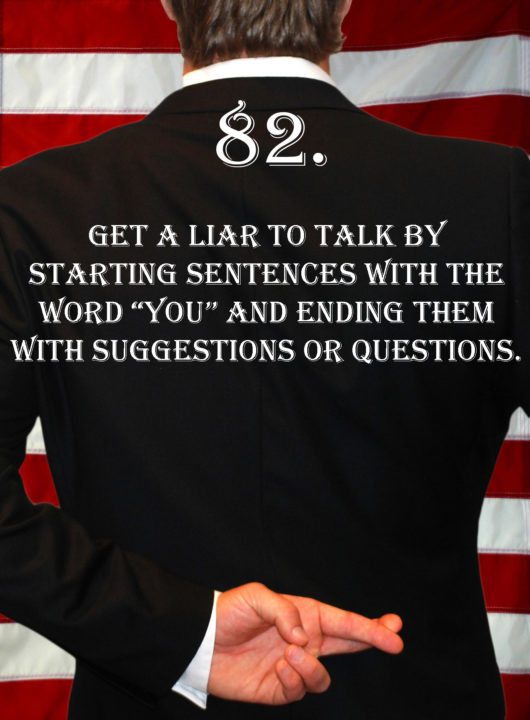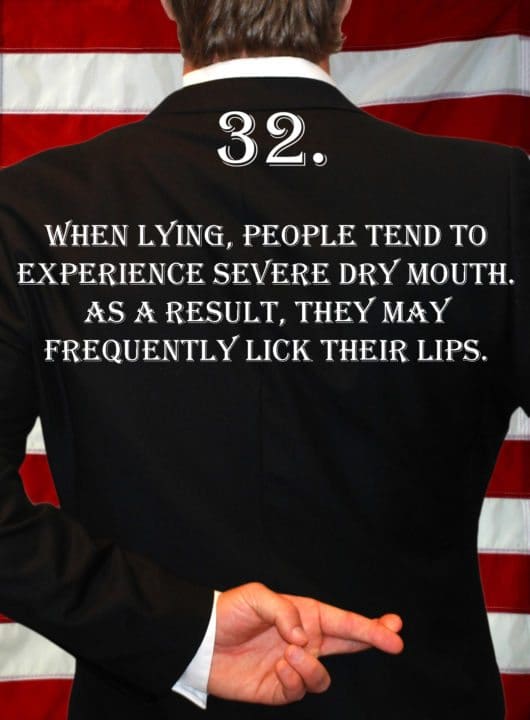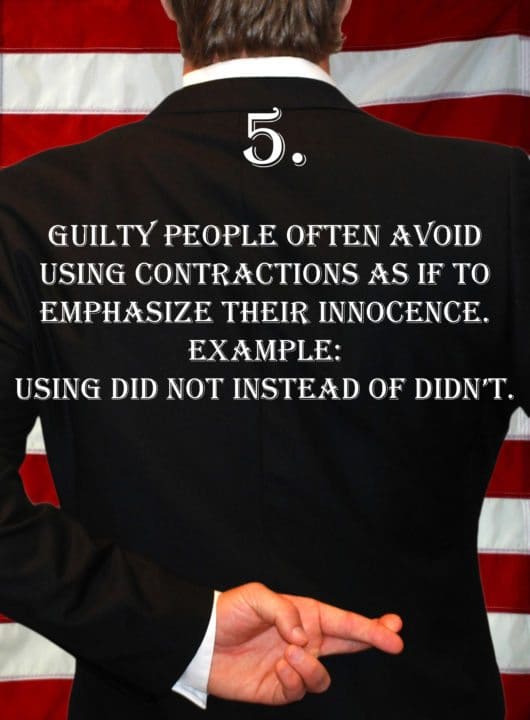
Deception Tip 82:
Get a liar to talk by starting sentences with the word “you” and ending them with suggestions or questions.
Listen To The Podcast!
E82 – Starting Sentences – Deception Tips Podcast – Click Here To Subscribe
Podcast Transcript
Hello, and welcome to the deception tips podcast where you will learn amazing cues to detect deceit that will help you read people like never before. I’m your host Spencer Coffman, let’s get started.
Hello and welcome to episode 82 of the Deception Tips podcast. Last time, we talked about a somewhat controversial way or method for you to improve your deception detecting skills.
We discussed watching television with the TV on mute. You can either watch live, non-fiction TV as in politician speeches or city council meetings, or news anchors speaking.
TV journalists talking, live, not scripted TV events or you can even watch TV shows and movies. A lot of controversy in that as well, when someone is an actor in a TV show or a movie, they’re acting, so would they really be exhibiting these true signs of body language deception, or nonverbal and verbal signs of leakage? Well, the answer is yes, because these actors really get into the roles.
They’re working on this project for a long time, several weeks, even months, sometimes up to years on playing this specific role. So, in their minds, they have become that person, they are who they are acting to be, and they believe that that’s who they are.
It’s not a case of associative identity disorder or multiple personalities or whatever it’s called, whatever you want to call it, whatever helps you understand what I’m talking about.
It’s not a case of that, they’re not crazy where they think they’re two different people. No, they are just really getting into that role and they are becoming that role, they’re being a great actor.
Therefore, when they lie in the movie or the TV show, they are really lying, they believe that they’re lying because they aren’t supposed to do that in their role, their act or their part did something and now they’re lying about it.
Well, they did it, they’re lying about it, they will show these signs. So, you can watch that kind of TV for a little bit more entertainment or you can watch the speeches. When you’re watching politicians, chances are they’re lying quite a bit in their speeches, especially if you’re watching before they get elected. Once they get elected, they really have no reason to lie, they’re going, to tell the truth.
They’re going to pretty much tell the truth, it depends on the politician, it depends on who they are and it depends on your political stance. If you’re a conservative then you’re going to think all liberals are lying but if you’re a liberal, you’re going to think all conservatives are lying.
Therefore, to further enhance your deception detecting skills, watch the politicians that you agree with, that way you’re not going to be automatically biased against them.
So, if you really like the president then you watch the president speak, if you really like a certain candidate who’s running for president then you watch that person speak.
Obviously, you’re probably going to want to hear what they’re saying because you really like it, but I would encourage you to then go on YouTube or something and watch the playback because you can see it again.
So, maybe the first time you watch and listen to it so that you know what’s going on politically, then the second time you can watch it on mute. You’ll have an idea of what they’re saying and you can really start to get into their body language and you won’t be biased believing that everything they say is a lie.
Today, we are going to talk about another thing that you can do to help you get the truth. This is more of a solicitation type of tactic, it’s a strategy you can use to get someone to tell you the rest of the story or the whole story. It is similar to different things that we’ve talked about before, such as when you are suggesting an answer for someone and they feel the need to correct you.
We talked about that in episode 21 or even having the suspect or the person you’re questioning suggest their own consequences or the consequence if someone were to commit a similar crime as we talked about in episode 27. It’s like a lot of these things where it’s using them to help learn more of the story, you are giving them the opportunity to correct you.
It’s almost like they need to fix what you believe because you’re getting it all wrong. So, here it is this is Deception Tip number 82. Get a liar to talk by starting sentences with the word ‘you’ and ending them with suggestions or questions. Here it is again, Deception Tip number 82. Get a liar to talk by starting sentences with the word ‘you’ and ending them with suggestions or questions.
So, why would this work? Well, when you start a sentence with the word ‘you’, you are directly putting it on someone, so you are talking directly about them. Then if you end it with some kind of a suggestion or a question, you’re jumping to a conclusion. So, you’re showing them that you’ve already made up your mind, you are talking about something.
You’re putting them in that position, you’re jumping to a conclusion and you’ve already got your mind made up on exactly what happened and how it happened. Chances are you’re going to be wrong, which is good because you want to blow this out of proportion. You want to be wrong in your hunch on this because that’s the whole point of this tactic.
You are coming up with some kind of a scenario that is a little bit out there and they will not like that. They’re going to be like, ‘no, wait, you got it all wrong, it’s this’, they want to fix it, so therefore they are going to talk. It’s like accusing them of a greater crime, then they will admit to the lesser crime because they don’t want to get the book thrown at them for that larger crime.
When you accuse someone of something, they are either going to deny it or admit it, or they’re going to lie about it. Now, if you accuse them of something greater and you say we’ve got evidence and it’s condemning, you’re going to have it wrong. They’re going to defend themselves and say no way, they don’t want that to happen. Therefore, this is similar to when you have the wrong scenario and you put them in that scenario.
They are going to want to defend themselves and get out of that, they’re going to correct you. We talked about this heavily in episode number 26, Accusing Liars, when you accuse them of a greater crime to get them to admit to a lesser crime. So, keep that part in mind that this is almost a form of accusal and we’re going to talk a lot more about it and some different things and some examples of statements you can use, coming up right after this.
Would you like to really know what every body is saying? Understanding body language can help you in your career, your relationships, and in everyday interactions. Get Spencer Coffman’s A Guide to Deception online today.
Welcome back to Deception Tip episode number 82, where we are talking about how you can use certain sentences and suggestions or questions in order to get the liar to talk.
They’re going to talk because they’re going to believe you’ve got it all wrong, they’re going to want to defend themselves, they want to set the story straight. So, then they are going to start talking to make sure that you fully understand what is going on.
Before we took the break, I mentioned that we’d be talking about some different examples you can use when we came back, so that’s what we’re going to do. You want to entice them to talk and make them feel like they have something to explain. The only way you can do that is if you come up with a scenario and you have it wrong, so you’re going to intentionally get it all messed up.
They are going to be so frustrated and think you are inept. They’re going to feel the need to step in and explain it because they are so much smarter and more knowledgeable about what happened.
You’ve got it all wrong and they want to set the record straight. So, you need to insinuate things, you need to put them on the spot, make them feel like they must defend themselves, or justify the situation because you’re not seeing it correctly.
If you only understood what I know or what I did or why I did it, if you could be in my shoes, then you would understand. You need to make them feel like that so that they will explain it to you so that you will understand. Again, a great way to do this is by starting the sentences with the word ‘you’ and then finishing them with a question or a form of a suggestive statement.
For example, one may be, ‘you went to work, and then what happened?’ That’s ‘you’ and then a question, ‘what happened after that’. ‘You did this and then what happened?’ ‘Then what?’ ‘Tell me about after that’, that’s the suggestion, they may tell you the story.
The other one would be getting it wrong, ‘so you decided to take matters into your own hands instead of letting more qualified people take care of it. Things got out of hand and someone wound up hurt or dead’.
You took matters into your own hands, you’re putting them on the spot, and now you are directly accusing them of doing something. That is huge because if they didn’t do it, they’re going to need to defend themselves, they’re going to feel put on the spot, and they may feel like they’re about to get in trouble for something they didn’t do. This will all prompt them to start talking to help you get the story straight, which is exactly what you want.
You need to make them feel like they have something to answer for like they need to speak or everything is going to be all messed up and the world will end. Like you have it all wrong and they need to straighten it out so that you can understand exactly what’s happening. When they feel like this, oftentimes, they will start talking to help set the record straight so you understand what’s going on.
Liars want you to believe their lies but they also want you to believe something that’s similar to either what they want you to believe or the truth. Therefore, if you come up with your own crazy story and you think you have it all down and you come off a little bit more confident and cocky.
It’s not what they wanted you to believe, they’re going to fix it, even if you’re believing something and their fixing it gets them to incriminate themselves, they’ll still do it.
It’s a matter of human nature and pride, we, as humans, want people to understand what we’re saying, we want to be heard, we want to talk and we want people to listen. So, when they come in there with a story and a lie and they tell it to you and then you misinterpret the entire thing and say, ‘ah, this is exactly what happened’. They say, ‘no, you’ve got it all wrong’.
They are going to re-explain themselves time and time again, even if they trip over their tongue, contradict themselves, etc. This gives you an excellent opportunity to watch for other behaviors and spot those patterns and clusters. The more times they explain their story or tell it to you and give you the scenarios and things that happen, the more chances they have to mess up, to exhibit different signs.
The unconscious has a lot more opportunities to push forth these truthful behaviors. Therefore, if you’re paying attention, you have a lot more opportunities to see them and you will be that much better at detecting deception.
They will be telling the same thing over and over and they’ll be slipping up. Use this to your advantage, insinuate things, put them on the spot, accusing them of things, get the story wrong, and let them correct it.
Allow them to speak, don’t interrupt them once they start because this is key. Now they finally have the chance to talk to you, to straighten out your wrong story, let them talk. We’ve talked about this before in episodes Stay Silent and Become Silent. Stay Silent, episode 13, Become Silent, we talked about it a little while later.
It was one where it’s important to let them finish talking so that they will continue their story. That was episode 69, so quite a bit of gap between those but they’re both very important. You need to let them speak, so insinuate, get them all messed up so that they think that you are way off path then allow them to explain themselves.
If you still don’t have it quite right or you still didn’t pick up anything, change your story a little bit and say, ‘okay, so this is really what happened’ and still get it wrong.
Do that time and time again so that they continually get more and more frustrated, explain more and more then you will be able to see the different signs of deception that they are leaking and where they might potentially be lying.
So, I want to thank you for listening to this week’s episode of the Deception Tips podcast. I hope that you’ll share it with your friends, subscribe to the feed, check out the deception tips videos, the blog, and take a look at the books I have available and, as always, tune in next week for a new deception tip.
Video Transcript
Hey guys, my name is Spencer Coffman, thank you for watching the Deception Tips videos. They’re all about teaching you how to read people and detect deception so that you will be able to tell if someone is lying to you. Today, we are going to talk about a tactic that you can use that will help to get the liar to talk, to continue talking.
To feel a little bit more at ease with the situation so that they will be more apt to tell you this story and to either trip up or contradict themselves or whatever needs to happen for you to get at the truth. That’s what we’re talking about today, it is an important tip. So, here we go, this is Deception Tip number 82. Get a liar to talk by starting sentences with the word “you” and ending them with suggestions or questions.
There are a couple of things to this tip, you want the liar to talk. Oftentimes, people who are lying have a story to tell, so they’re going to talk anyway. If you’re in a situation where you need to get some form of information from them, you need to get them to talk. What they’re going to tell you may be false, so you need to know whether or not it’s going to be true and you need to just keep them talking and get them going.
Sometimes liars, they’re eager to get that lie out so they’re going to come in there, they’re going to start talking and bam, you can hardly get them to stop but this is for the times that you need to get them talking. So, what you’re going to do is you want to start sentences with words that incorporate them to reply to something, so start them with the word “you” and them finish them with stuff that gets them talking.
For example, if I say you were at such-and-such place last night, right? You’re accusing them of being there but not directly. I’m not saying well, I know you were there last night, you’re saying you were there last night, right and then you’re ending it in a question, that that’s going to get them to talk and reply. It’s going to do one of two things, if you’re right and they were there, they’re either going to deny it and lie or they’re going to say yes and then you just need to keep going.
If you’re wrong and they weren’t there, they’re going to tell you because they don’t want to be associated with something they didn’t do. So, they’re going to be like, no, I wasn’t and that’s going to get them talking and then you can say, well, where were you and keep them going down that path. Use this tactic to get them to talk, remember you want liars to talk.
We’ve talked about this before in a few different episodes with Staying Silent, Becoming Silent, and allowing them to speak, listening to the entire story. We’ve spoken about this before, so if you can get them to talk and start them talking, that’s going to be very important because having them speak is half the battle. If they’re already talking, you’re halfway there because when a liar is speaking, they are trying to convince you of that lie.
They’re trying to convince themselves of that lie and they’re also trying to convince themselves that you believe the lie. They’re also stressed about the lie, they’re stressed about the consequence of the lie, they’re stressed about the consequence of the actions of whatever was being lied about and they’re stressed about the consequence of lying.
They’ve got all this stuff going on but if you can just get them talking, they’re probably going to continue because it’s almost like they just need that release. So, get them talking, start things off with sentences that will keep them going because if you can get them going that is going to be hugely important and it’s going to help you out a lot more than you think.
So, if this is your first time watching these videos, I’d love to have you subscribe to the channel on YouTube. Feel free to comment with any questions you may have as well. Also, if you’d like some more information, we’ve got books, podcasts, blog posts, all available on spencercoffman.com that are dedicated to teaching you exactly what every body is really saying.
Until next time.






